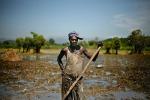World Food Programme Director Discusses World Hunger, Haiti
 Josette Sheeran, the Executive Director of the World Food Programme (WFP), spoke this week at the Center for Strategic and International Studies on “The Silent Tsunami" of hunger that threatens to push 100,000,000 more individuals into extreme poverty. You can imagine that Haiti came up several times during her presentation. Haitians are resilient people but soaring costs of food prices (and the subsequent increase in percentage of household income spent on food) is pushing people to their limits. As Ms. Sheeran noted, “The difference between civilization and anarchy is seven meals.” Hunger is a global problem and we do not have the option of not responding.
Josette Sheeran, the Executive Director of the World Food Programme (WFP), spoke this week at the Center for Strategic and International Studies on “The Silent Tsunami" of hunger that threatens to push 100,000,000 more individuals into extreme poverty. You can imagine that Haiti came up several times during her presentation. Haitians are resilient people but soaring costs of food prices (and the subsequent increase in percentage of household income spent on food) is pushing people to their limits. As Ms. Sheeran noted, “The difference between civilization and anarchy is seven meals.” Hunger is a global problem and we do not have the option of not responding.
 The WFP has changed a lot through the years. Most of the food it supplies used to come from surplus, but now that figure is only 2%. The agency has moved away from “food aid” toward “food assistance” – using food as a mechanism to address underlying causes of hunger. At present, 80% of WFP food is purchased locally or regionally. This allows them to bolster economies while meeting the needs of the most vulnerable. 80% of transport is arranged locally supporting local companies. 80% of employees are not expatriates but are from the countries where operations take place, allowing them to build capacity.
The WFP has changed a lot through the years. Most of the food it supplies used to come from surplus, but now that figure is only 2%. The agency has moved away from “food aid” toward “food assistance” – using food as a mechanism to address underlying causes of hunger. At present, 80% of WFP food is purchased locally or regionally. This allows them to bolster economies while meeting the needs of the most vulnerable. 80% of transport is arranged locally supporting local companies. 80% of employees are not expatriates but are from the countries where operations take place, allowing them to build capacity.
 The WFP is a logistical giant. They are able to get staff and goods on the ground in an extremely short period of time. During the (most recent) Israel/Lebanon war, they had deployed within 48 hours which is very impressive. If trucks or planes won't work, then canoes, donkeys, or other animals are used. They do not just transport food. In emergencies they get humanitarian workers in and out and move medicines for the WHO as well. WFP is one of the largest deminers in the world, as land which is mined cannot be used for agriculture. It is also a major player in deforestation. In its history, the WFP has planted over 5 billion trees, mainly to protect agriculturally productive areas from erosion. In some settings, WFP plants trees in the holes left over from landmine removal. It is a powerful, symbolic image. To any extent, WFP knows nothing it does is sustainable without environmental protection.
The WFP is a logistical giant. They are able to get staff and goods on the ground in an extremely short period of time. During the (most recent) Israel/Lebanon war, they had deployed within 48 hours which is very impressive. If trucks or planes won't work, then canoes, donkeys, or other animals are used. They do not just transport food. In emergencies they get humanitarian workers in and out and move medicines for the WHO as well. WFP is one of the largest deminers in the world, as land which is mined cannot be used for agriculture. It is also a major player in deforestation. In its history, the WFP has planted over 5 billion trees, mainly to protect agriculturally productive areas from erosion. In some settings, WFP plants trees in the holes left over from landmine removal. It is a powerful, symbolic image. To any extent, WFP knows nothing it does is sustainable without environmental protection.
 Given the draught in Western Australia that has radically reduced wheat yields, the declining American dollar, increased consumption of meat products (which takes a lot of grain) in China and India, increased processing of biofuels from food crops, and chronic underinvestment in agriculture, WFP has had to release an extraordinary emergency appeal – just to be able to meet the needs of the same populations as last year.
Given the draught in Western Australia that has radically reduced wheat yields, the declining American dollar, increased consumption of meat products (which takes a lot of grain) in China and India, increased processing of biofuels from food crops, and chronic underinvestment in agriculture, WFP has had to release an extraordinary emergency appeal – just to be able to meet the needs of the same populations as last year.
 If WFP is not able to receive the requested funds, it will likely have to begin cutting enrollment for 300,000 – 400,000 school children in feeding programs worldwide. This is unfortunate as the agency has been very successful at keeping girls in school by providing the family with extra rations for every week of perfect attendance. School attendance will decline when families are hungry and girls will be the first to be denied an education as a result. Interestingly, WFP estimates they could feel all the school children in the world with 3 billion dollars a year, even now. It sounds like a lot, but the long term benefits would be immense.
If WFP is not able to receive the requested funds, it will likely have to begin cutting enrollment for 300,000 – 400,000 school children in feeding programs worldwide. This is unfortunate as the agency has been very successful at keeping girls in school by providing the family with extra rations for every week of perfect attendance. School attendance will decline when families are hungry and girls will be the first to be denied an education as a result. Interestingly, WFP estimates they could feel all the school children in the world with 3 billion dollars a year, even now. It sounds like a lot, but the long term benefits would be immense.
 Ms. Sheeran highlighted the vulnerability of African farmers. I think much of what she said applies to Haitian farmers as well. In response to this food crisis, many farmers will produce not more but less food as they will not be able to buy fertilizer and other agricultural inputs needed for productive farming. The past decade saw an era of abundant food at relatively cheap prices. As a result, national governments and the international community have underinvested in agriculture. This has to change. Already many African governments, recognizing the depth of the crisis, are committing to increase their percentage of GDP spent on agriculture. Haiti should as well. Farmers in Haiti and Africa need technical assistance and access to agricultural inputs. In both settings, agricultural knowledge has been passed down informally from generation to generation. Climate change could affect where, when, and how to plant most effectively.
Ms. Sheeran highlighted the vulnerability of African farmers. I think much of what she said applies to Haitian farmers as well. In response to this food crisis, many farmers will produce not more but less food as they will not be able to buy fertilizer and other agricultural inputs needed for productive farming. The past decade saw an era of abundant food at relatively cheap prices. As a result, national governments and the international community have underinvested in agriculture. This has to change. Already many African governments, recognizing the depth of the crisis, are committing to increase their percentage of GDP spent on agriculture. Haiti should as well. Farmers in Haiti and Africa need technical assistance and access to agricultural inputs. In both settings, agricultural knowledge has been passed down informally from generation to generation. Climate change could affect where, when, and how to plant most effectively.
 Concerning Haiti, she pointed out that Haiti’s pre-existing hunger and high household expenditure made it especially vulnerable. WFP knows it needs to be more in Haiti, but only 13% of its emergency appeal for the country has been met. WFP will meet the needs of Haiti's vulnerable if it is able to get the support it needs.
Concerning Haiti, she pointed out that Haiti’s pre-existing hunger and high household expenditure made it especially vulnerable. WFP knows it needs to be more in Haiti, but only 13% of its emergency appeal for the country has been met. WFP will meet the needs of Haiti's vulnerable if it is able to get the support it needs.
 As mentioned, the Haitian government has announced rice subsidies. I really wish they would have done this a month ago before frustrations boiled over. Haitians are still nervous. As the protestors pointed out, people do not survive (let alone thrive) on only rice. What about the other staples like beans and corn, let alone vegetables and fruit? Sorry to sound like a broken record, but national production is the only way out.
As mentioned, the Haitian government has announced rice subsidies. I really wish they would have done this a month ago before frustrations boiled over. Haitians are still nervous. As the protestors pointed out, people do not survive (let alone thrive) on only rice. What about the other staples like beans and corn, let alone vegetables and fruit? Sorry to sound like a broken record, but national production is the only way out.
 Ms. Sheeran concludes that we do not have the option of not dealing with food security. As riots around the world have shown, the need for basic resources could very well become the peace and security issues of our lives. She emphasized that food security can be achieved worldwide. No scientific breakthroughs or new research is needed. What is needed is the political will of the international community.
Ms. Sheeran concludes that we do not have the option of not dealing with food security. As riots around the world have shown, the need for basic resources could very well become the peace and security issues of our lives. She emphasized that food security can be achieved worldwide. No scientific breakthroughs or new research is needed. What is needed is the political will of the international community.
Ms. Sheeran is optimistic that if the attention (and committment!) of the world can be sustained, we can ensure food security for the poorest of the poor. How to encourage food security in Haiti? Sending food won't work - Haiti is largely in this mess because it has been dependent on imported food. Supporting WFP and other organizations that are helping Haitians to help themselves would make a real difference.
Thanks and welcome your thoughts.
 Donations to WFP help. But there are other ways to help. If you have a moment, play the Free Rice Game. Free Rice is a program that donates rice to WFP and allows users to build their vocabulary at the same time. Thanks to private sponsors, the game has allowed for the feeding of over 1,000,000 children and when budgets are as tight as they are now, every bit helps.
Donations to WFP help. But there are other ways to help. If you have a moment, play the Free Rice Game. Free Rice is a program that donates rice to WFP and allows users to build their vocabulary at the same time. Thanks to private sponsors, the game has allowed for the feeding of over 1,000,000 children and when budgets are as tight as they are now, every bit helps.
Bryan
Add new comment